Brooke Castillo has turned the Life Coach School into a multimillion-dollar business, earning her celebrity status in the coaching world. Despite the steep enrollment fee of over $18,000, thousands of aspiring and experienced coaches have signed up for her certification program, hoping to emulate her success.
The pandemic brought Castillo’s school and the entire coaching industry an upcurve but the latest reviews paint a mixed picture, with many graduates in regret and high debt. Let’s explore what these independent reviews say about Brooke Castillo, the Life Coach School, and its online certification program.
Who Is Brooke Castillo?
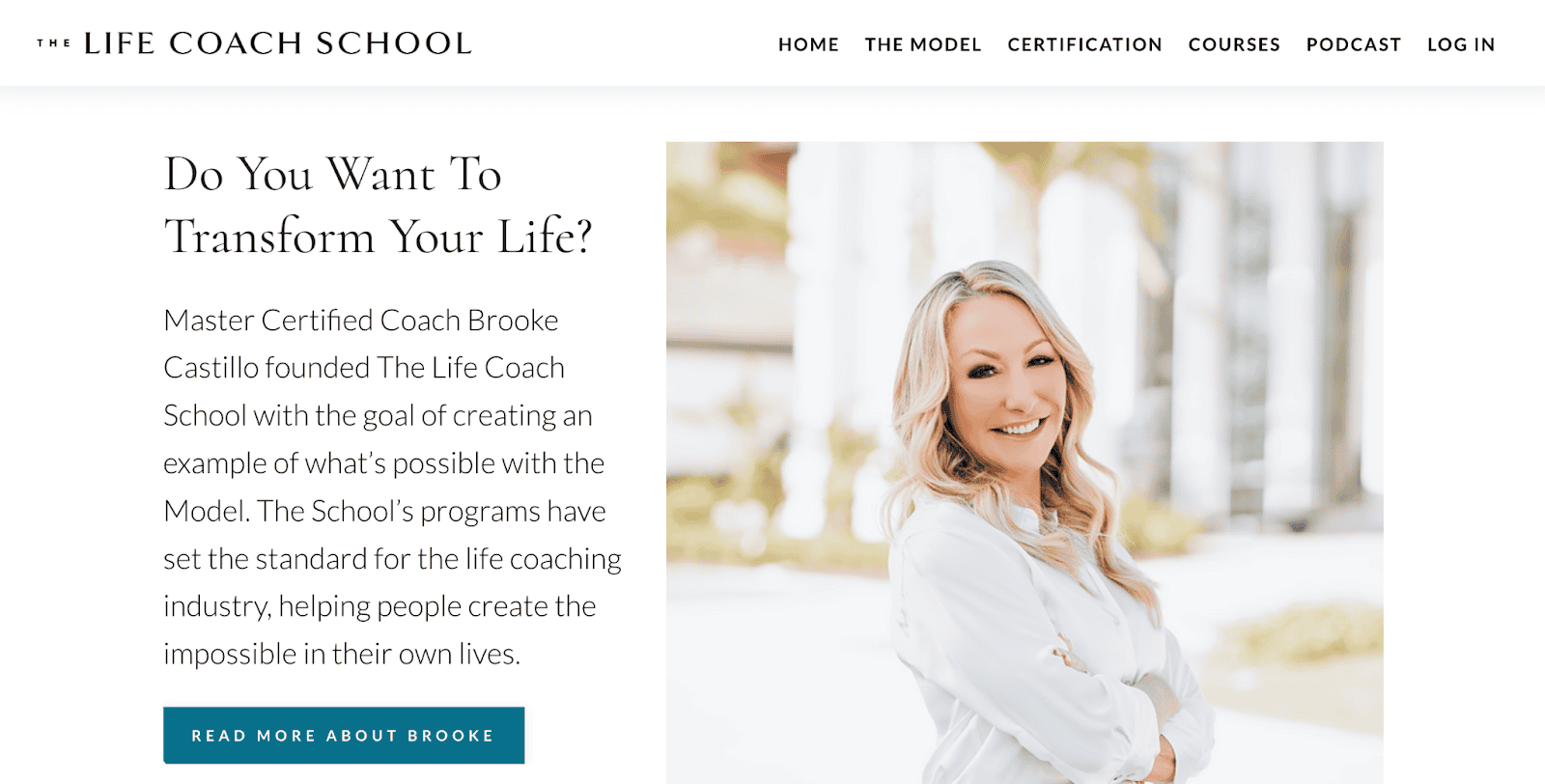
Brooke Castillo is a life coach and founder of The Life Coach School (LCS). She first discovered life coaching through an interview with American author Martha Beck on The Oprah Winfrey Show and decided to get certified through her three-day program.
Initially, she focused on weight loss coaching, particularly helping women overcome emotional eating through mindset shifts rather than diet plans. She later created her own coaching model and founded The Life Coach School to teach it to other coaches.
Over time, her focus shifted to group coaching and, eventually, to training others on her model. She scaled her business into a multi-million dollar enterprise, selling high-ticket coaching programs and certifications.
What Is the CTFAR Model?
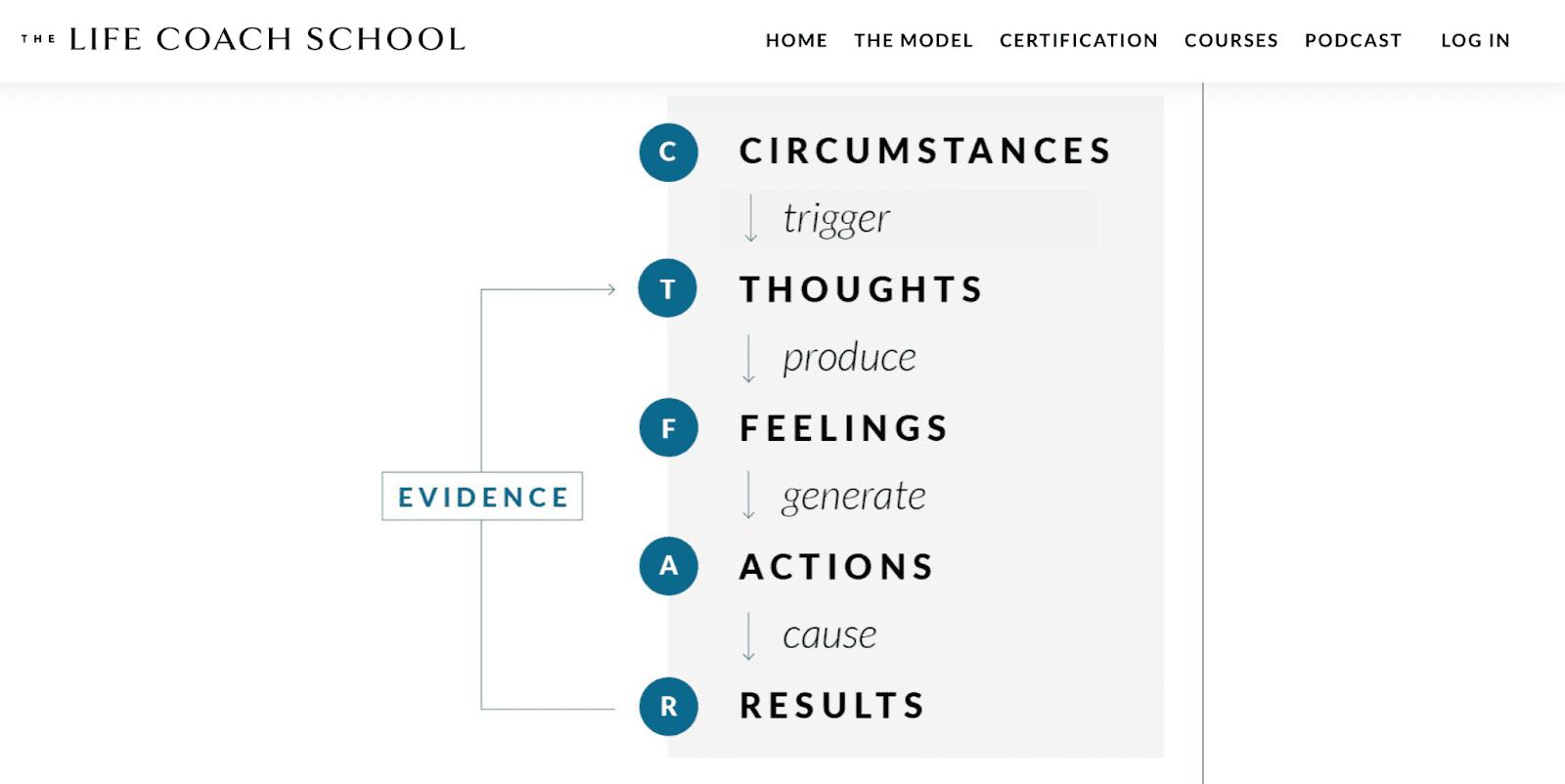
Brooke Castillo’s self-coaching model is a framework designed to help people understand how their thoughts influence their lives. It is based on the idea that our circumstances are neutral, and that it’s our thoughts that determine our emotions, actions, and ultimately, our current reality.
Both the Self Coaching Scholars and Certified Coach Program at LCS are built on this model.
The five components of the model are:
- Circumstances (C): Neutral facts that everyone would agree on, like getting a text from a friend saying, “I can’t make it tonight.”
- Thoughts (T): Interpretations, opinions, or beliefs about the circumstance, such as “She doesn’t like me anymore.”
- Feelings (F): Emotions generated by our thoughts, like sadness, disappointment, or rejection.
- Actions (A): Behaviors that result from our emotions, such as ignoring future texts or withdrawing emotionally.
- Results (R): The outcomes created by these actions, for example, keeping distance from this friend, reinforcing the belief that they don’t like us.
The premise of this model is that our thoughts determine our feelings and actions, not our circumstances. It aims to foster emotional awareness and self-responsibility, an important aspect of coaching.
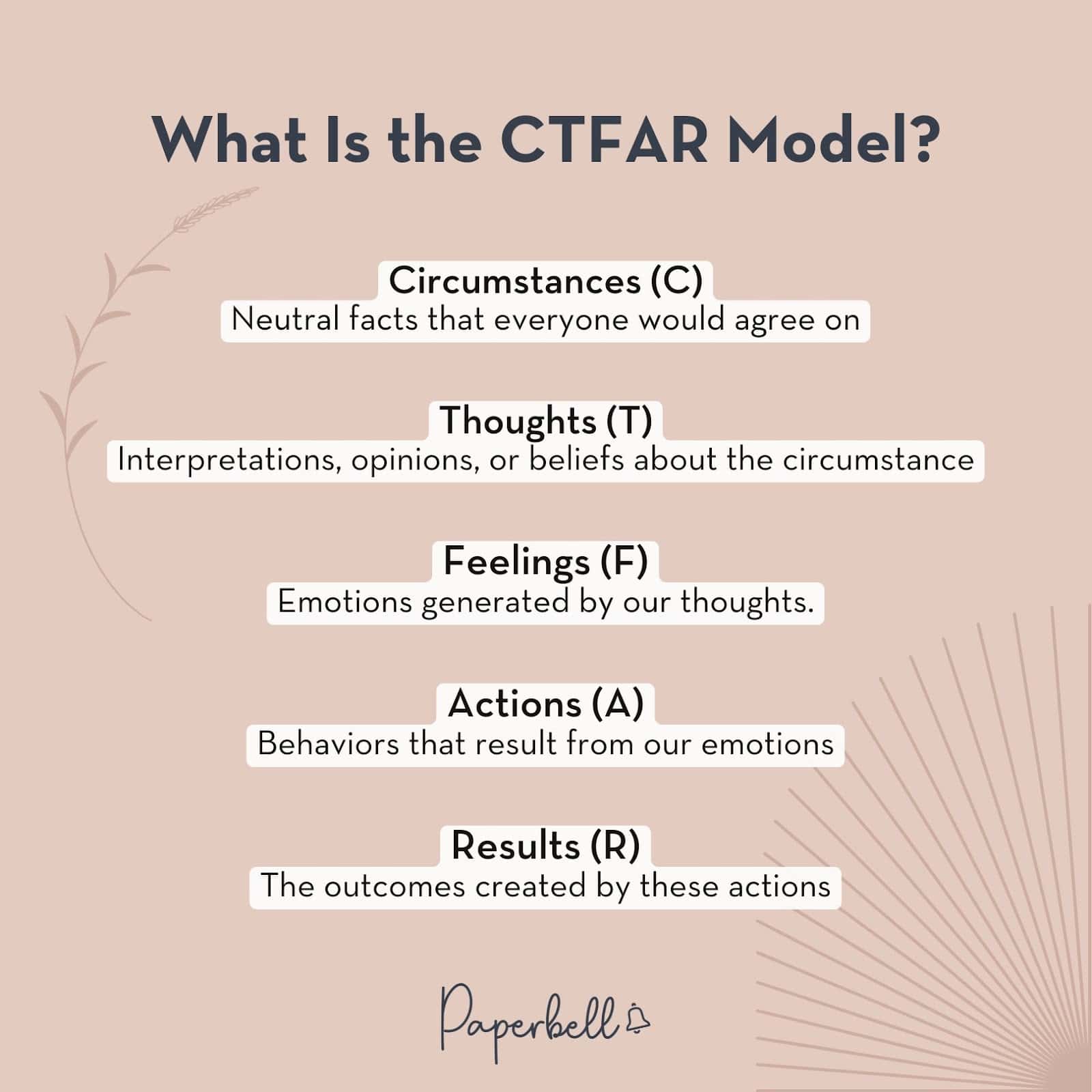
The problem is that LCS claims CTFAR can solve any problem despite its clear limitations.
The Limitations of CTFAR
Structured models are foundational tools for coaches. Using classic frameworks like GROW and the Feelings Wheel help acknowledge the client’s circumstances and emotions and even allow space for reframing one’s perspective.
However, these frameworks don’t suggest that thoughts alone determine success, and they don’t blur the lines between therapy and coaching either.
Organizations like the International Coaching Federation (ICF) have clear ethical guidelines for when coaches should refer clients to a mental health professional. LCS students, on the other hand, are encouraged to use the model on any client in any situation, with the real risk of bypassing underlying issues like trauma, mental health challenges, or systemic factors.
According to Rachel Monroe’s investigative piece in the Guardian, when LCS students raised serious concerns like anxiety, eating disorders, and suicidal thoughts during the program, their complaints were dismissed as negative thinking. Instead of being referred to a mental health professional, they were urged to sign up for other programs.
As some students have pointed out, Brooke Castillo’s model is a simplified version of Cognitive Behavioral Therapy (with some positive thinking mixed in) without the evidence-based foundation. It teaches coaches to reframe difficult emotions rather than acknowledging deep-seated issues that can’t be resolved with mindset shifts alone.

LCS’s philosophy is that mindset is the sole determinant of success and that if you haven’t reached your goals, you just need to repeat the framework.
This notion combined with the incentive of potentially sky-high coaching fees, much like Castillo’s, is a recipe for coaches overstepping their qualifications and offering solutions better suited for therapists.
The Certified Coach Program at The Life Coach School
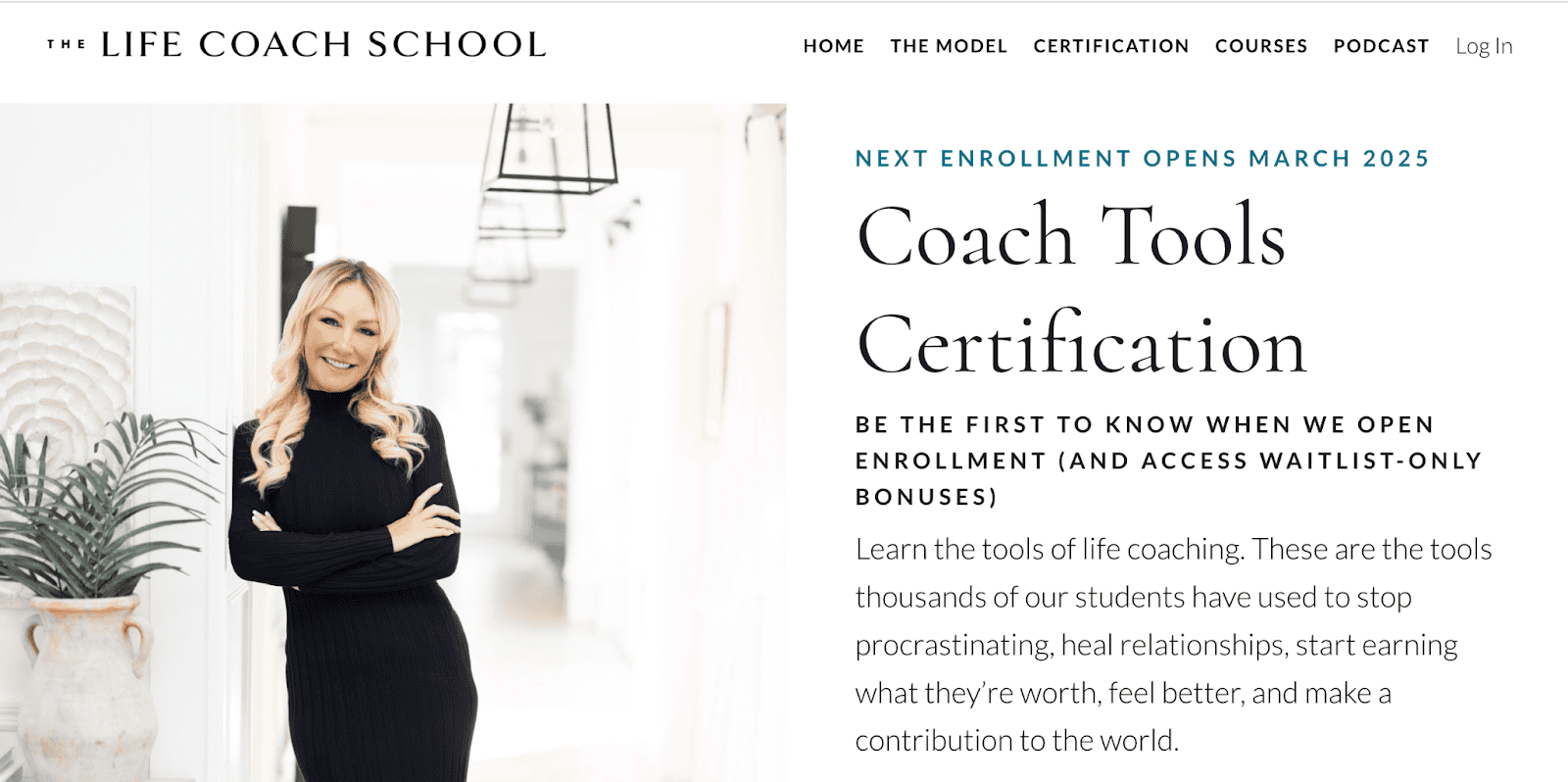
The Certified Coach Program (CCP) is the flagship training program offered by LCS. It’s built on Brooke Castillo’s model and focuses on mindset coaching and sales strategies.
Although the school’s website provides limited information about the program, past students have mentioned a duration of 3-6 months and a cost of $18-23,000.
The program includes access to The Life Coach School’s community and mentorship, although it’s been highly criticized for its limited feedback opportunities for students.
CCP is different from Self-Coaching Scholars (SCS), a monthly membership geared toward individuals who want to learn self-coaching tools.
Independent Reviews About the Life Coach School
Trustpilot features 55 reviews of LCS with an average rating of 3.1. The 5-star reviewers claim the school has changed their lives, particularly praising Brooke Castillo and the effectiveness of her teachings.
Many of these ratings focus on Castillo’s The Life Coaching School Podcast and her self-coaching membership program, a more affordable alternative at a few hundred dollars a month.
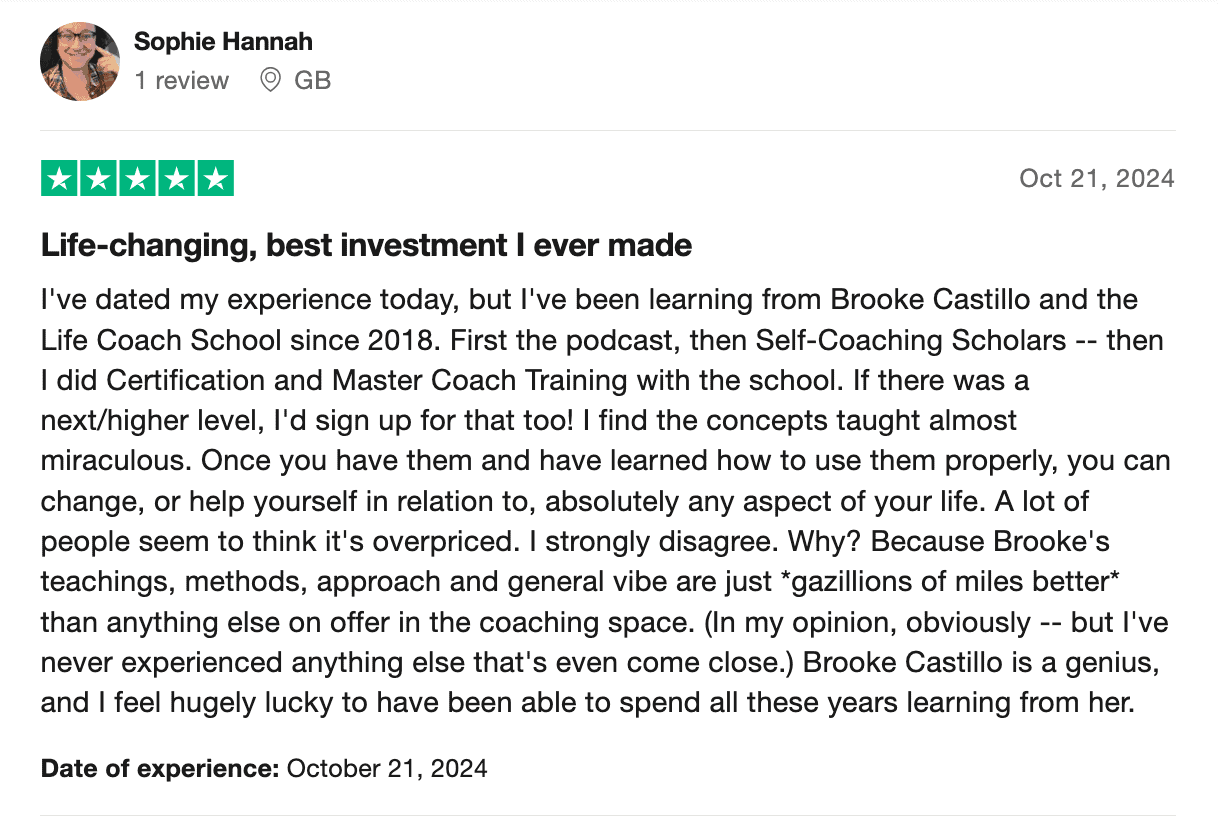
However, positive opinions about the certification (priced at $18,000 and upward) are few and far between. Additionally, several students pointed out that many of these 5-star reviews come from Castillo’s team.
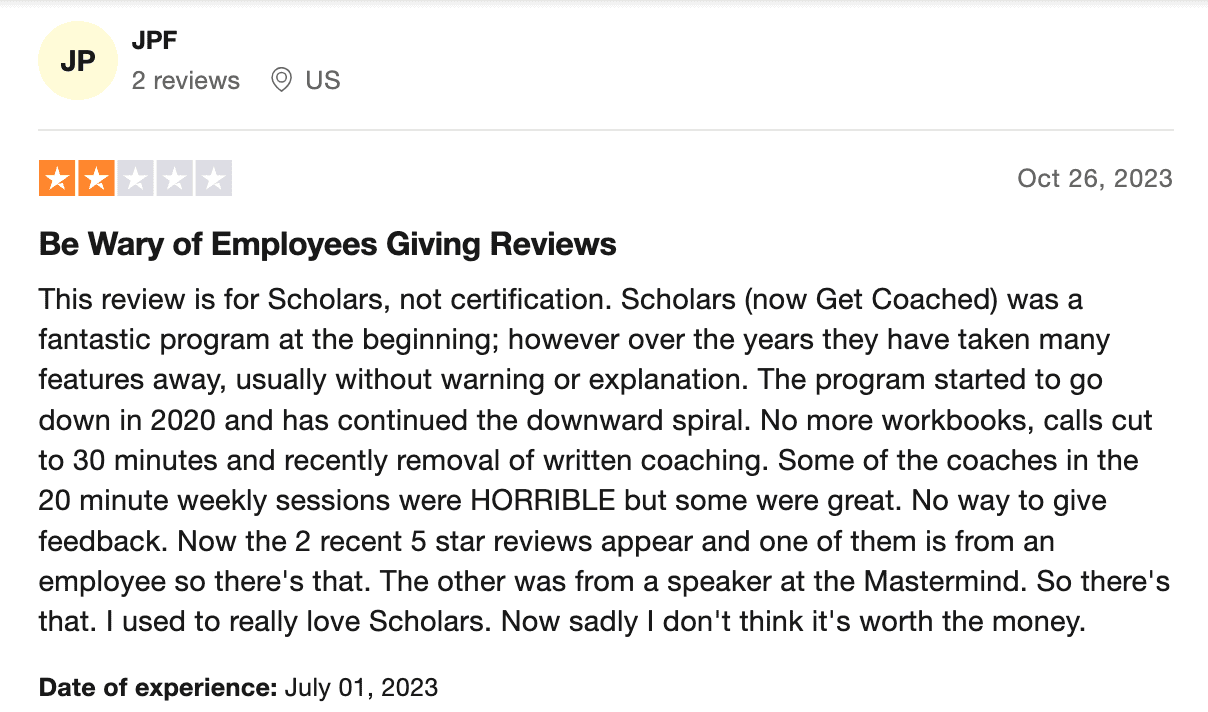
The rapid growth of LCS (and the coaching industry as a whole) during the pandemic has boosted the company’s revenue to $50 million a year. At the same time, the quality of its products dropped, turning previous fans of the school away.
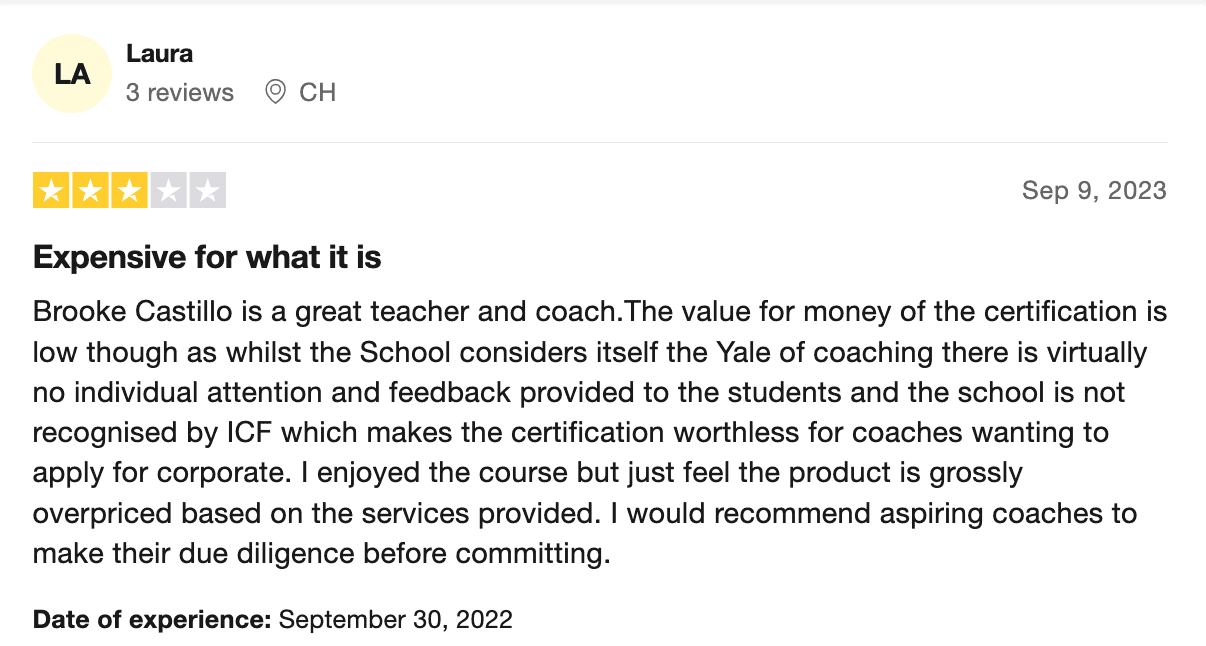
They felt they didn’t receive the personalized support and quality training the program promised, despite its record-breaking fees on the coach certification market.
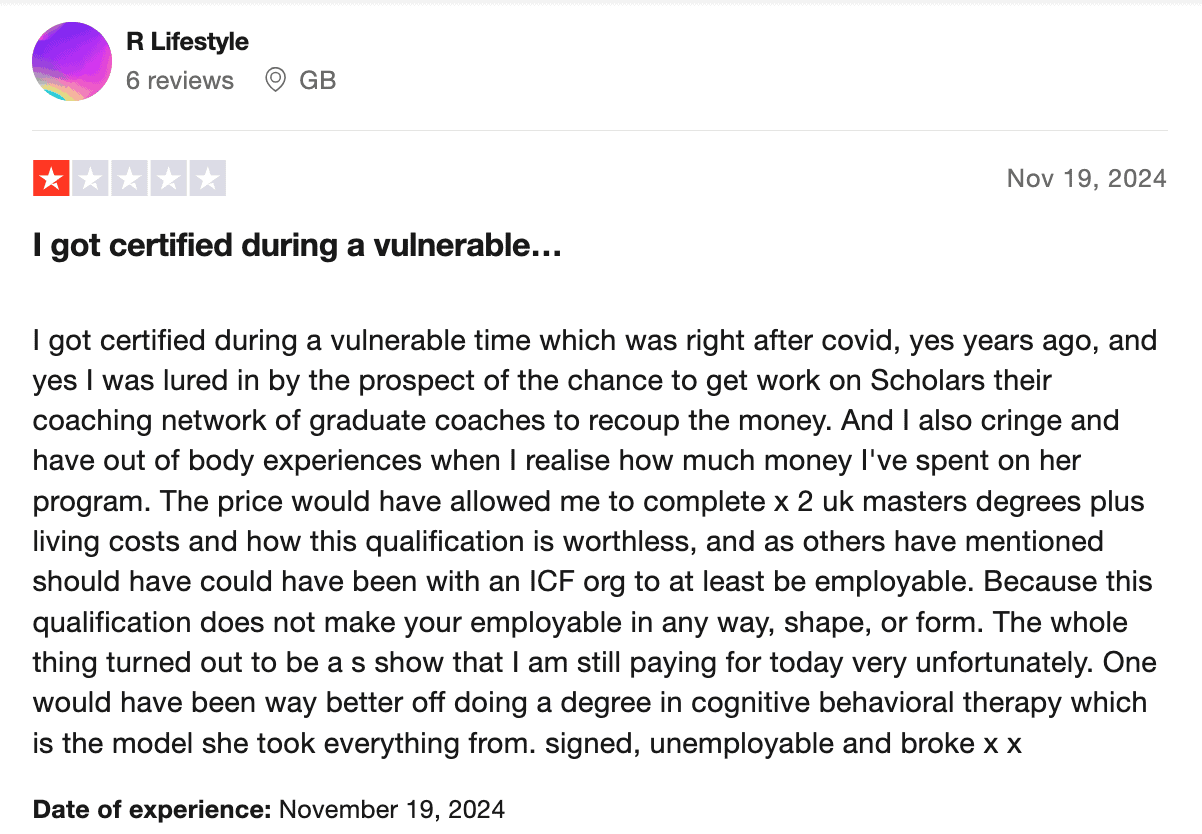
What’s more alarming is that students weren’t simply encouraged to “invest” in themselves but to go into debt and drain their life-long savings to pay for the program. An anonymous reviewer who attended LCS’s live webinar said, “I got that Fear of Missing Out vibe and started feverishly checking all my credit card limits.”
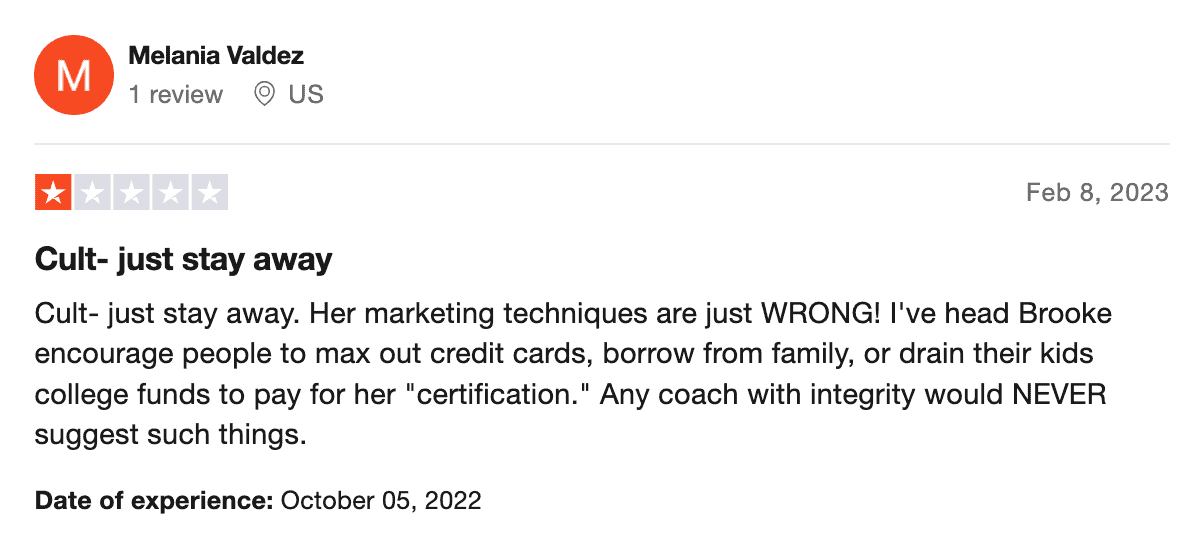
A common marketing strategy LCS applies is to feature past students who are wildly successful. However, those hoping to emulate these coaches were disappointed to find out that they were already highly experienced business owners before they entered the program their success was credited to.
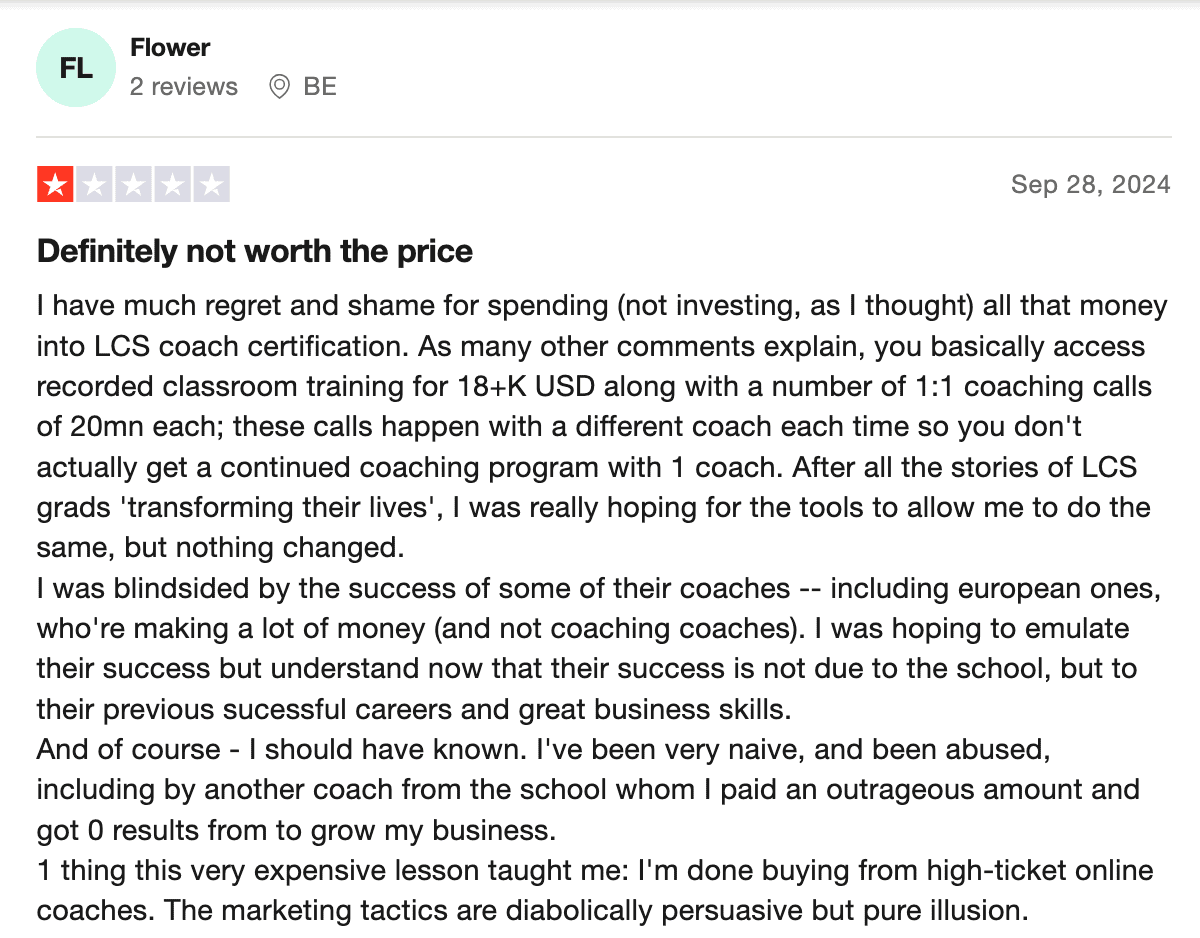
A student who was dissatisfied with the curriculum said, “Here are some important things the program will not teach you: Science-backed techniques, understanding of the mind, body or anything related to data-driven or evidence-based practices, trauma therapy, how to find clients, how to find people to practice on while you are just learning, how to start a coaching session and basically anything other than CTFAR.”
The Fall and Rise of the Life Coach School
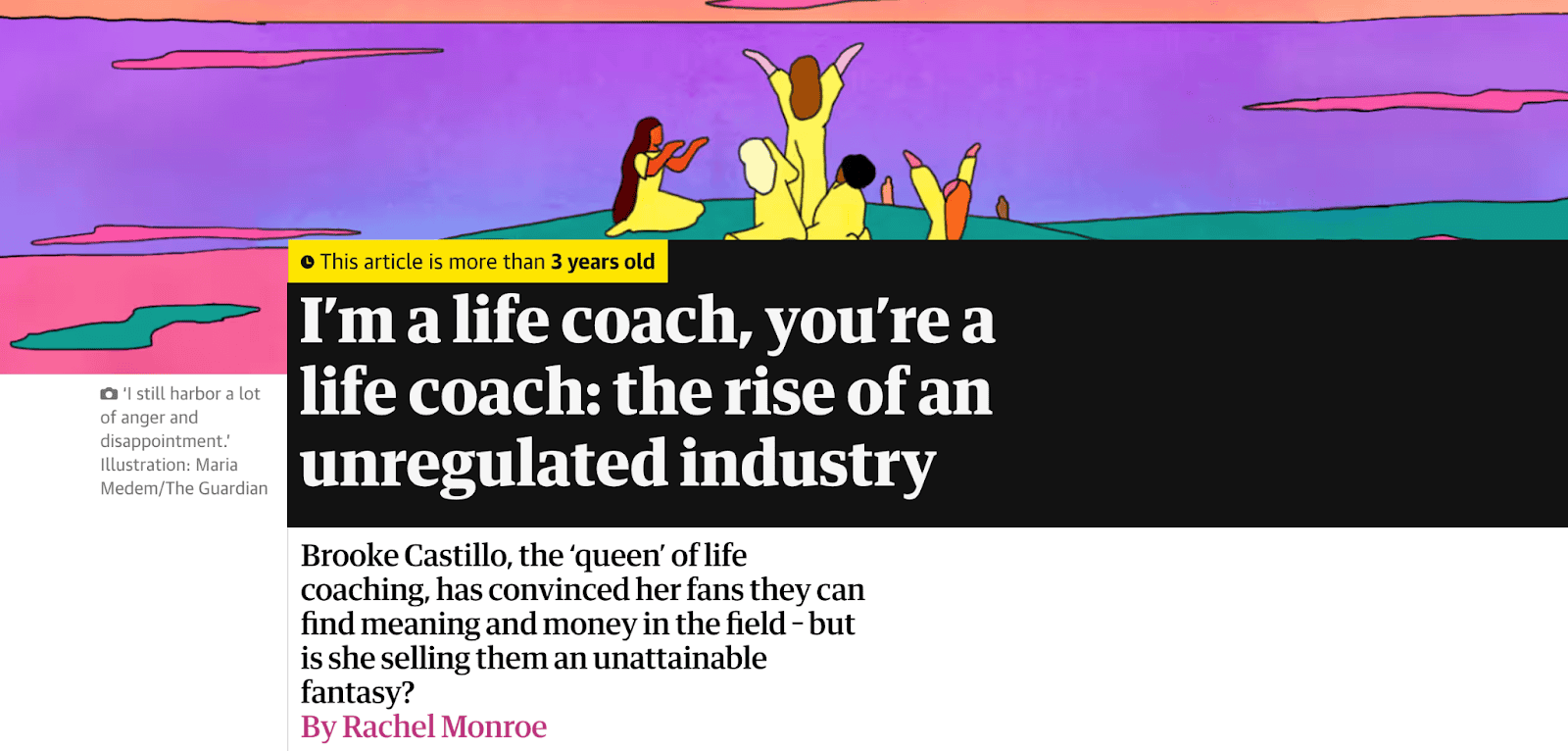
Rachel Monroe’s 2021 piece in the Guardian seems to have opened a can of worms. She interviewed Castillo and some of her disillusioned students and team members, exposing the “cult-like” culture where Castillo’s point of view can’t be questioned. An employee quoted in the article said, “We get in big trouble if we talk to Brooke.”
Another member of the community, who also filed a complaint against the school, echoed this, saying, “LCS has created a highly skilled marketing machine that attracts new recruits in ever-increasing numbers. But behind the paywall, LCS coaches know that there are problems.”
She added, “We also know that we have been groomed to not say anything about these problems, or even to think that they are problems.”
During the pandemic, the number of life coaches rose by 54% as many looked for more meaningful careers and financial stability. LCS promised an easy (albeit expensive) path to financial success for these aspiring coaches without the need for traditional credentials.
However, those who took a chance on LCS felt frustrated with the lack of substantial instruction, minimal feedback, ethical concerns, and Castillo’s absence from the training.
Instead of addressing the concerns voiced by these students, the school encouraged them to invest more money (many of them already in high debt) into additional coaching, often with Castillo’s protégés, like Stacy Boehman.
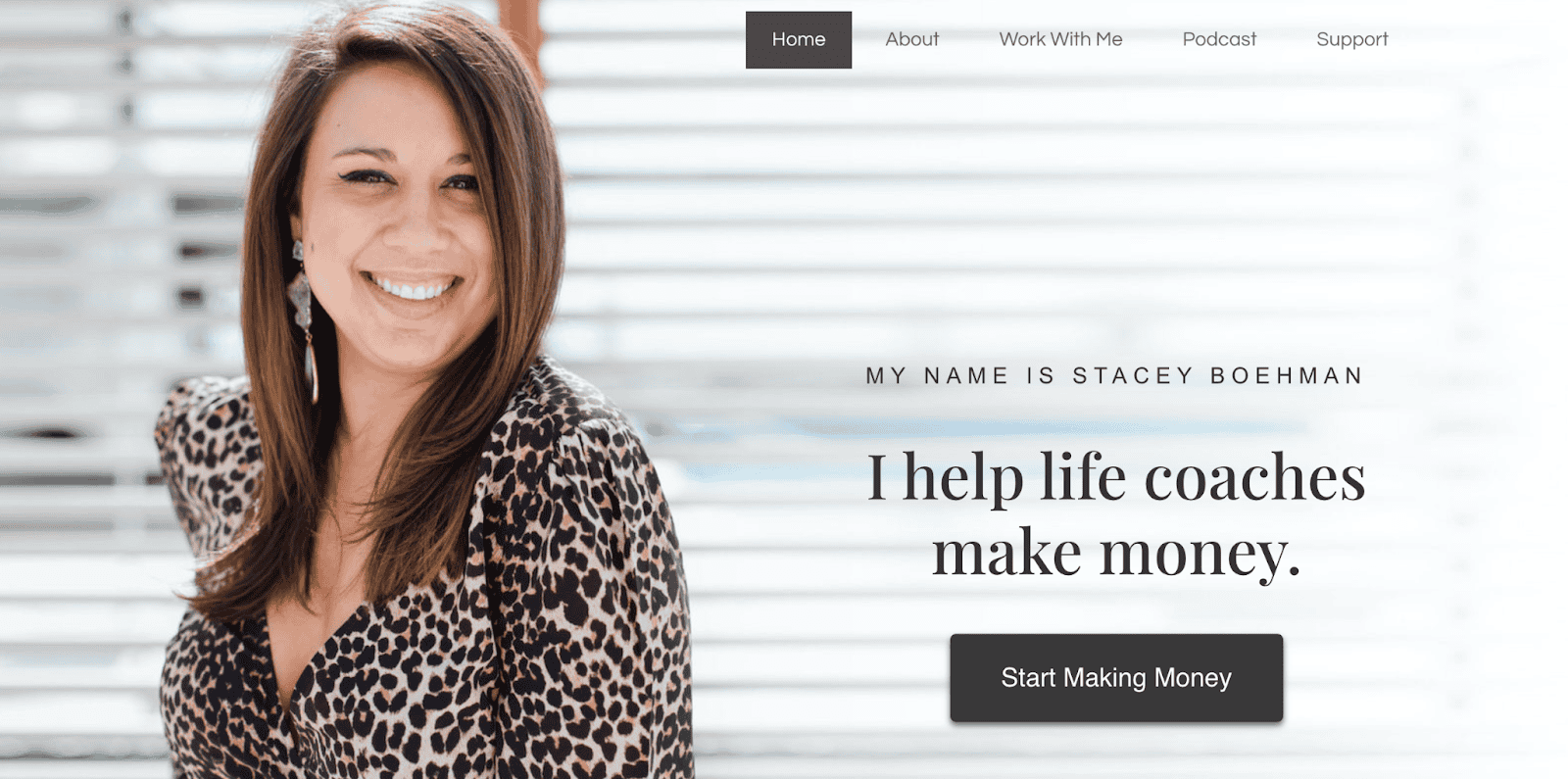
LCS maintained a polished public image by suppressing criticism on its platforms and selling a promise of financial success with aggressive sales tactics. Meanwhile, the dissatisfaction among students kept rising.
After the article, reviews from regretful students in debt, coaches, and therapists flooded various Reddit boards and Trustpilot. This made positive follow-up reviews (as some students flagged, written by Castillo’s team) and the carefully curated “review” page of LCS published in 2023 appear as mere damage control.
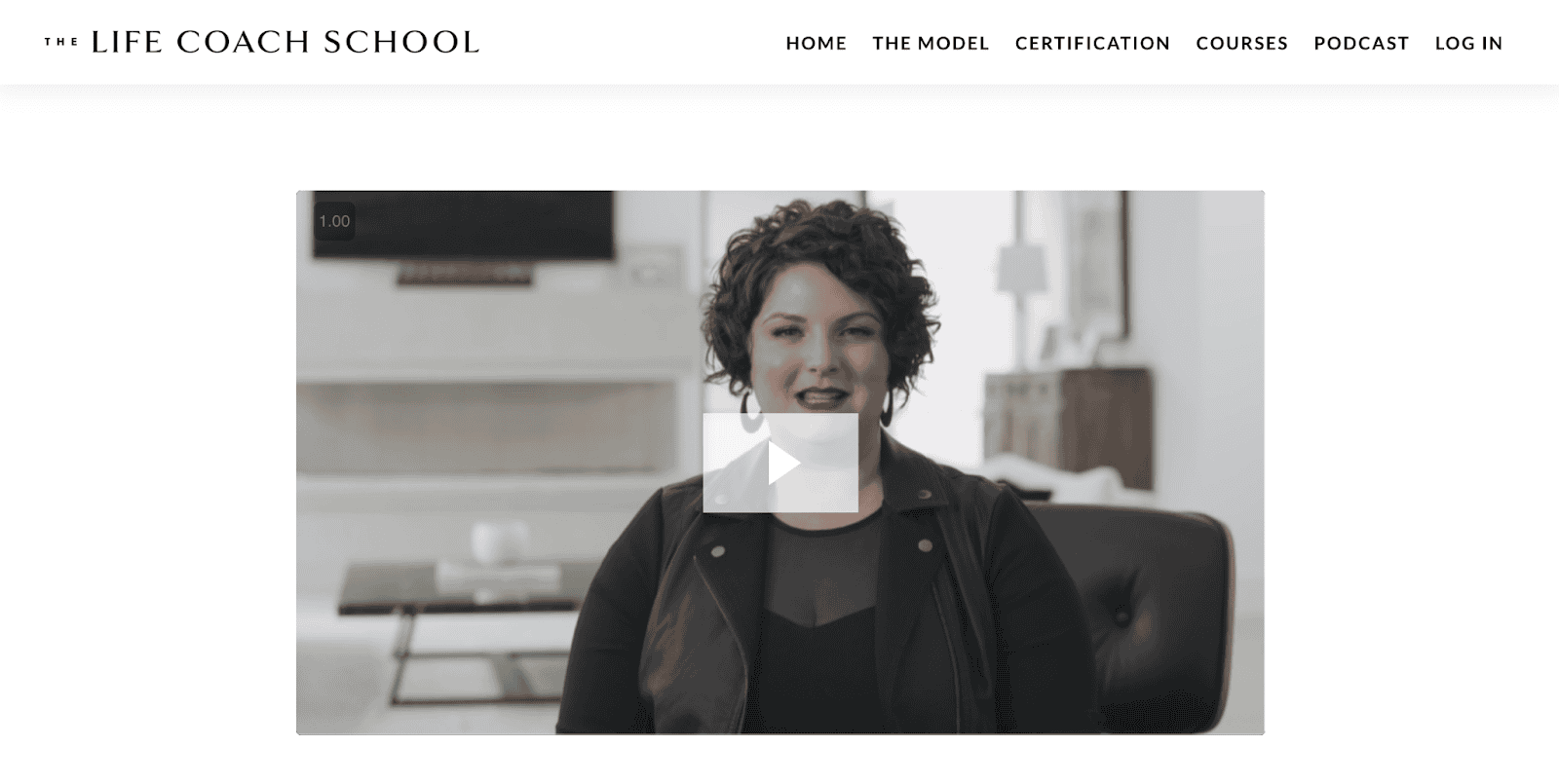
Even those who were previously fans of The Life Coach School podcast felt that Castillo is motivated by meeting her revenue goals rather than helping her students.
As one of them expressed, “Over time, the podcast went from helpful information to thinly veiled sales pitches,” urging listeners to invest in themselves by signing up for LCS’s programs with increasingly bloated enrollment fees.
Alternatives to the Life Coach School
If you’re looking for coaching certification alternatives, here are a few programs we’ve reviewed previously on our blog.
Jay Shetty and Tony Robbins are other celebrity coaches who sell their namesake programs. However, even considering their mixed bag of reviews, their curriculum is more extensive and costs less than Brooke Castillo’s training.
If you would rather invest in a program with less celebrity glamour and more rigorous training and ethical standards, there are plenty of alternatives. Consider looking into a program accredited by the International Coaching Federation (ICF) or another reputable coaching organization.
ICF-accredited programs have a structured curriculum that covers core coaching competencies, ethical considerations, and hands-on experience (that goes way beyond positive thinking).
They also provide you with credentials that are widely recognized around the world. Because of that, many corporate coaching opportunities require or prefer ICF-certified coaches.
On average, these programs range from $3,000 to $12,000, significantly less than The Life Coach School’s certification, while offering more comprehensive and evidence-based training.
Some reputable ICF-accredited programs include:
- Institute for Professional Excellence in Coaching (iPEC)
- Coach Training Alliance (CTA)
- Co-Active Training Institute (CTI)
- Institute of Positive Psychology Coaching (IPPC)
We also have a more detailed guide specifically on mindset coaching certifications and courses you can consider.
While not all coaching certifications teach you sales strategies, there are plenty of marketing training options that teach you how to get clients for a fraction of the enrollment fee at LCS.
So, Is the Life Coach School Worth It?
While Brooke Castillo’s Life Coach School has gained significant attention, particularly during the pandemic, it’s not the only (or necessarily the best) option for coaching certification.
If you’re looking for more affordable, evidence-based, and well-respected training and credentials, many accredited institutes provide strong foundations for a successful coaching career.
Whether you choose to study the methodology of a well-known coach or invest in accredited certification, make sure to weigh the costs, training quality, and long-term value before making a decision.
Our team at Paperbell wishes you huge success in building the future of your coaching practice!










